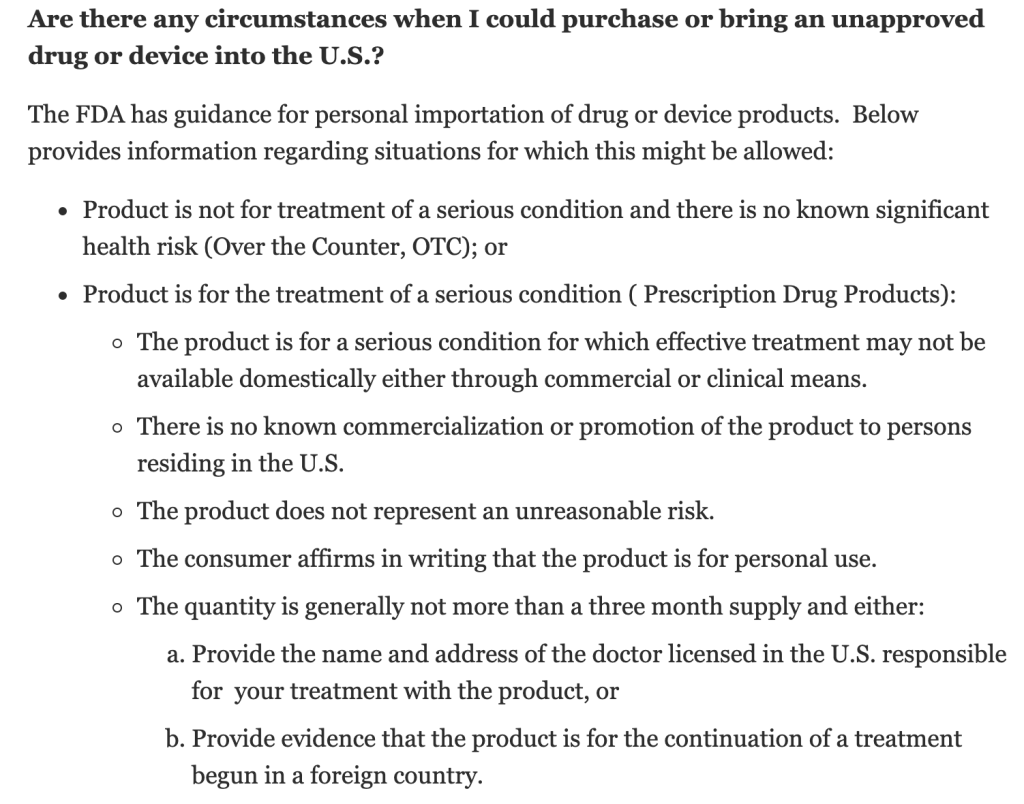The FDA is allegedly working with the USPS to hold packages containing Ivermectin at JFK, a port of entry for the drug from foreign sources. Aaron Siri posted a Nov. 10 letter using FDA Personal Importation policy to refuse delivery of the drug to a customer whose name is redacted on the letter.
According to the FDA's policy, the Personal Importation policy makes it "in most circumstances, illegal for individuals to import drugs or devices into the U.S. for personal use because these products purchased from other countries often have not been approved by the FDA for use and sale in the U.S. For example, a drug approved for use in another country but not approved by the FDA would be considered an unapproved drug in the U.S. and, therefore, illegal to import."
The FDA says it cannot guarantee the "safety and effectiveness" of a medication purchased over the internet from a foreign country. The document then provides exceptions for the order of Ivermectin given its well-established safety profile and its lack of availability in the U.S. due to the recent rejection of the drug for off-label use for COVID-19.
 FDA Personal Importation/https://www.fda.gov/industry/import-basics/personal-importation#whatis
FDA Personal Importation/https://www.fda.gov/industry/import-basics/personal-importation#whatis
While COVID-19 can be a serious condition, the health risks for Ivermectin, absent of what seem to be political or financial motivations for its removal, show that Ivermectin has a very good safety track record. There are over 80 studies on Ivermectin, many of which are completed and show its safety and efficacy as an anti-viral treatment.
Ivermectin has been difficult to obtain because of the recent lockdown on its use by the FDA. Consumers are repeatedly met with resistance from pharmacies to fill Ivermectin orders. The order referenced in the letter above is for two hundred (200) 12 mg pills. The consumer does not appear to wish to commercialize or promote the product. Ivermectin has been well-established as safe, despite what the media or the FDA has attempted to assert.
The FDA letter does not state a precise set of conditions for importing and using a drug manufactured overseas. It appears to leave room for conditions that look like the ones we have right now—"situations for which this might be allowed." Ivermectin has been available for decades and proven to be safe, and it is exceedingly difficult to obtain the drug in the U.S.
There is growing evidence of Ivermectin's efficacy in the prevention and/or treatment of severe symptoms and/or death from the virus.
A brief search on the internet shows some evidence of a precedent for this kind of FDA action with regard to imported drugs. However, the 2013 event involved 11 generic drugs from a specific manufacturing plant in India that may have been out of compliance with U.S. manufacturing standards. Nowhere in the article does it state that one of those drugs was or was not Ivermectin. The ICE.gov website shows a restriction on Ivermectin that seems to indicate a maximum 30-day supply.
Congress has presented legislation to allow "expanded importation of eligible prescription drugs" to the U.S. from Canada for consumers. FFDCA Section 804 "gives the HHS Secretary authority to promulgate regulations to establish a drug importation program under which pharmacists and wholesalers could import unapproved prescription drugs from Canada into the United States, with certain qualifications."
Previous reporting by UncoverDC shows that Ivermectin has been labeled as a "wonder drug" from a "human use perspective." It has been on the WHO list of approved and essential medications since 1987. The drug is inexpensive and shown in multiple studies and in practice to be safe and effective in treating COVID-19.
In August, however, when demand for the drug began to increase, the FDA and the media amped up a campaign to stop its use for COVID-19. Their main reasons against using Ivermectin to treat COVID-19 are it is also used for animals to treat heartworm, and it isn't safe for "off-label use" for humans. Ivermectin was developed to treat Onchocerciasis, or River Blindness, in West Africa, winning a Nobel Prize in 2015.


